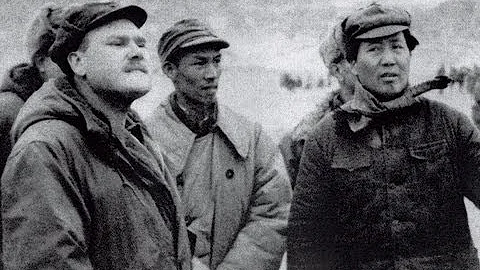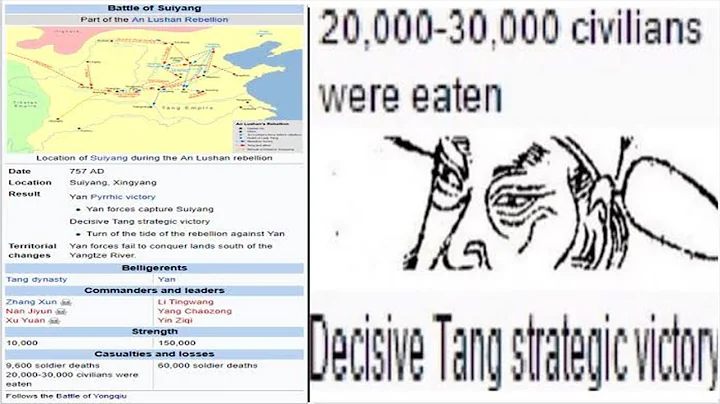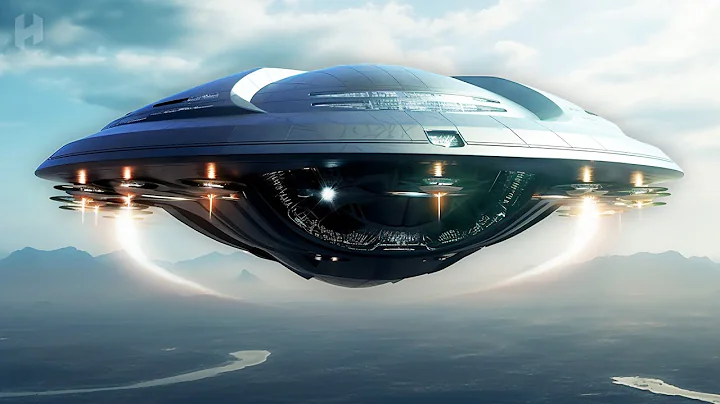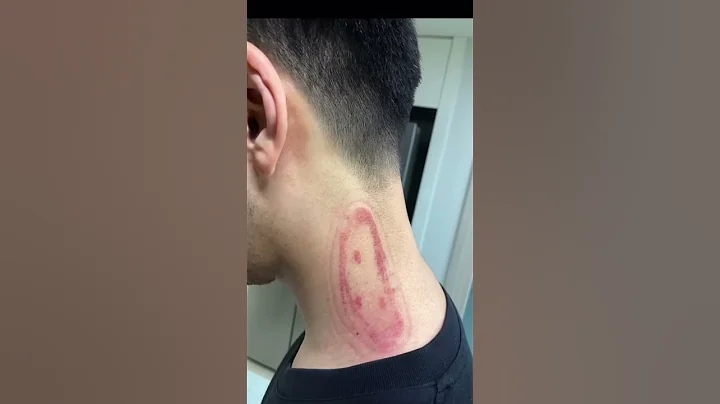This battle was an important battle commanded by Xu Xiangqian to annihilate the Yan Xishan army, which laid the foundation for the subsequent liberation of Shanxi. But in fact, this war was not only a precursor to the liberation of Shanxi, but also a war between China and Japan. Military confrontation.
Many friends may know that the Battle of Jinzhong was a classic battle in which a small number defeated a large number, and was also a miracle in the history of the Liberation War. But to say that this war was a duel between Chinese and Japanese soldiers, some people may not understand: Anti-Japanese War Isn’t the war on long over? Why did the Battle of Jinzhong involve the Japanese?
In fact, because Yan Xishan colluded and protected the Japanese behind the scenes, Shanxi harbored a group of Japanese soldiers, and these Japanese soldiers also became a major obstacle for Xu Xiangqian in the Battle of Jinzhong.

Why did Yan Xishan collude with the Japanese? What is the truth behind the scenes? What are the unknown details of this war involving the Japanese army?
[The causes and consequences of Yan Xishan’s collusion with Japan? 】
In 1945, after the victory of the Anti-Japanese War, our country strived for peace internally and tried its best to avoid unnecessary wars. However, due to the influence of comprehensive factors, the national liberation war broke out. Since then, liberation wars have been launched across the country. .
In May 1948, after the People's Liberation Army conquered and liberated the southern Shanxi area, they encountered a problem - Yan Xishan, director of the Kuomintang's Taiyuan "Appeasement" Office.
Yan Xishan is the leader of the Shanxi warlord . He has been entrenched in Shanxi for more than 30 years and once supported Chiang Kai-shek. Now, in order to maintain his rule, Yan Xishan will use all his troops to strengthen the defense of Taiyuan, Shanxi.
According to statistics, Yan Xishan dispatched 5 military headquarters, 4 divisions, 22 security regiments and 21 security guard brigades, which also included some temporary temporary brigades with a total number of about 130,000 people.

(Overview of Yan Xishan)
The People's Liberation Army did not know at that time that they would have a tough battle to fight next. However, they did not expect that during the Liberation War, they would actually have a life-and-death struggle with Japanese soldiers, and this The showdown with Japanese soldiers also stemmed from Yan Xishan's collusion with the Japanese army.
Why is it said that Yan Xishan would collude with the Japanese army?
It turned out that during the Anti-Japanese War, Yan Xishan was determined to unite with the Communist Party to fight against Japan on the premise of supporting Chiang Kai-shek. Even so, Yan Xishan had been dealing with the Japanese army perfunctorily behind the scenes. In fact, it was only superficial.
In fact, as early as 1945, after the end of the Anti-Japanese War, Yan Xishan had contacts with the Japanese army.
After the victory of the Anti-Japanese War in 1945, Japanese war criminal Okamura Ningji became Chiang Kai-shek's "special guest". In the process, Okamura Ningji also conveyed the idea of "retaining the Japanese army" to Chiang Kai-shek, but Chiang Kai-shek ultimately rejected this The "invitation" sent by the Japanese army.

(Chiang Kai-shek’s old photo)
The Japanese army was helpless when they saw this, but interested people found that the warlord Yan Xishan seemed unwilling to offend them, so they tried to win over them, and Yan Xishan had already had this intention. Although there was no betrayal on the surface, he Under the influence of the enemy, he gradually moved towards the side of the national enemy.
In this way, Yan Xishan received a group of surrendered Japanese troops in Shanxi. Since the troops on hand at that time were indeed limited and there were difficulties in recruiting troops, Yan Xishan took advantage of the situation and took advantage of the opportunity to recruit these Japanese soldiers.
After much thought and hesitation, the balance in Yan Xishan's mind was still biased. He finally carefully selected more than 6,600 Japanese soldiers from this batch of surrendered troops and retained them for future use.
Yan Xishan must have never imagined that retaining these Japanese soldiers would be a precursor to a future confrontation with the People's Liberation Army.
Under the influence of multiple factors such as the solicitation of the Japanese army and changes in his inner thoughts, Yan Xishan began to condone these Japanese invaders. Under the "protection" of Shanxi's veteran warlords, the Japanese invaders also existed in the shadows. More and more unscrupulous.

(Yan Xishan’s old photo)
With Yan Xishan’s connivance, the Japanese soldiers openly lived in mansions and found jobs, and even their previous shameful “activities” were once again exposed to the broad daylight.
Not only that, many people with delusions are also trying to gradually achieve the goal of turning Shanxi into a Japanese colony through "Fuxing Brand Cigarettes", "Sakura Soap" and other cultural invasions.
Since the days of Cixi , old China has spent many years and efforts to break free from the quagmire of a semi-colonial and semi-feudal society. Now that the war of liberation is imminent, how can it be tolerated by Yan Xishan? A perverse move?
Therefore, in order to dispel the delusions of the remaining personnel, the People's Liberation Army, Yan Xishan's army, and the remaining Japanese army are about to have a tough battle to fight, and the vanguard leading this struggle is later "one of the ten marshals of the founding of the People's Republic of China" General Xu Xiangqian.

(General Xu Xiangqian)
[How did Xu Xiangxiang deal with the difficulties in the Battle of Jinzhong? 】
Xu Xiangqian graduated from the Huangpu Military Academy. After graduation, he stayed at the school as a platoon leader. He participated in many important battles and was famous for his strange, fierce, fast and ruthless military skills, so he was highly reused.
In 1947, Chairman Mao handed over the deputy commander of the Shanxi-Hebei-Luyu Military Region to Xu Xiangqian, and Xu Xiangqian did not live up to Chairman Mao's expectations. When encountering Yan Xishan's army, he quickly gathered forces from various local troops and compiled It became the First Corps of North China and used this corps to launch several attacks on Yan Xishan's army.
Facts have proved that Xu Xiangqian's ability to command operations is indeed good. After several attacks, the People's Liberation Army quickly captured Yuncheng and Linfen . By May 1948, Yan Xishan's territory was only in northern Shanxi. Datong and Jinzhong area .
However, the next battle will be more difficult to fight, and the difficulty of this battle mainly lies in three aspects.

1. Big difference in numbers
According to records, after several battles, the troops led by Xu Xiangqian only had a total of about 60,000 people left. Not only did they lack professional training, they also had no experience in fighting in large groups.
And Yan Xishan's army still has more than 100,000 people, which is nearly double the military strength. It can be said that if there is a head-on confrontation, the opponent can quickly "eat" his own troops due to the difference in numbers and combat experience.
2. Scarcity of equipment
Yan Xishan has been entrenched in Shanxi for many years. Although the combat readiness resources are sufficient, our army's equipment supply is insufficient, and the equipment is not as good as the enemy's equipment. The shortcomings of scarcity of equipment will be strengthened by the difference in numbers. more obvious.
3. Xu Xiangqian’s physical factors
As we all know, General Xu Xiangqian’s health has never been very good. He suffered from tuberculous pleurisy during the Anti-Japanese War, during which Chairman Mao also visited him.
Until the later period of resisting U.S. aggression and aiding Korea , Xu Xiangqian's health was not in good condition, and he missed the great opportunity to lead the army.

(Xu Xiangqian’s old photo)
At this time, Xu Xiangqian was not in good physical condition. Problems may arise at any time during the command of operations, and this is also one of the hidden factors that affects the results of operations.
So, in the face of these problems, how did Xu Xiangqian lead the troops to fight, and how did he confront Yan Xishan's army and the Japanese army?
Xu Xiangqian was not a reckless man when fighting. After some thinking and judgment, he came to a conclusion: It was currently June, wheat was about to mature, and the Taiyuan occupied by Yan Xishan was not a place rich in grain.
"With Yan Xishan raising such a large army, he must not be able to run out of food. If he does not rely on getting wheat during the summer harvest, Yan Xishan's army will definitely run out of food in subsequent battles. In other words, Yan Xishan will definitely seize the opportunity. This opportunity to find food - Jinzhong cannot be lost"
And Yan Xishan also understood that Jinzhong cannot be lost, so in the process of fighting for Jinzhong, the 34th Army,  3 Army, 61st Army and other 13 troops. A main regiment formed a "Blitz Corps" to try to block the People's Liberation Army and harvest wheat at the same time. A "Tenth Corps" mainly composed of Japanese soldiers also joined the battlefield.
3 Army, 61st Army and other 13 troops. A main regiment formed a "Blitz Corps" to try to block the People's Liberation Army and harvest wheat at the same time. A "Tenth Corps" mainly composed of Japanese soldiers also joined the battlefield.

(picture is Internet material)
However, after understanding Yan Xishan’s plan, Xu Xiangqian had already made sufficient preparations: he understood that the enemies were concentrated in Taiyuan, and it would be difficult to win with fewer enemies and more enemies, so he must lure the enemies. Go deep, let them out, and hit them one after another.
So, Xu Xiangqian decided to use the strategy of attacking from the east to the west and diverting the tiger away from the mountain to attract Yan Xishan's army out of the city: he first let a part of the army pretend to attack Fenyang and Xiaoyi, and after drawing out an enemy army, he quickly turned around and captured the main force. Pingyao , Jiexiu , Qixian , and quickly captured these three cities.
After Yan Xishan learned the news, he ordered the Lightning Corps to retreat quickly. However, in the process, our army, which had already been ambushing, also seized the opportunity to annihilate the enemy and route the so-called "Blitz Corps" to a complete defeat.
Yan Xishan was extremely angry after learning the news, but he could not relax his vigilance at this time, because there was also a Japanese 10th Corps, which was also a strong enemy of the People's Liberation Army.

(old photo of Yan Xishan)
Why is it said that the 10th Japanese Army Corps is a powerful enemy of the People's Liberation Army? When Chinese and Japanese soldiers meet again, what intense stories will happen on the battlefield?
[ Details of the Battle of Jinzhong : Our army stabbed the Japanese invaders to death with bayonets]
Later Xu Xiangqian found out that the leader of this team was called Zhao Chengshou , who was an old classmate of Xu Xiangqian, and the commander was named Yuan Quanxin , is a Japanese.
Xu Xiangqian knew Zhao Chengshou's temperament, which could be described as "foolish and incompetent". After learning that Yuan Quanxin was also an opponent who underestimated the enemy, he felt that there was nothing to be afraid of.
Therefore, Xu Xiangqian deployed his main army in the Qixian area and waited for the enemy to invade. However, Zhao Chengshou fell into the trap and ordered his troops to attack the Qixian area.
After learning that Zhao Chengshou had sent troops, he ordered the troops to retreat while fighting, and quickly contacted the rear troops to cut off the enemy's retreat to Taiyuan and cut off the railway to cut off possible enemy backup.

(Zhao Chengshou)
html On July 3, Zhao Chengshou arrived at the battlefield and realized that he had been tricked when he noticed something was wrong. At this time, he ordered the enemy to retreat quickly, but on the way he collided head-on with the 41st Regiment, which our army had laid an ambush in advance. , and a life-and-death struggle began.Xu Xiangqian ordered Taiyue Military Region , Taihang Military Region and other troops to break through various transportation hubs. Upon seeing this, Zhao Chengshou hurriedly ordered the temporary 46th Division, the 71st Division and the 10th Corps to take turns to attack the Dongcun position in an attempt to open up the north escape route. But ultimately to no avail.
During this period, Zhao Chengshou's troops tried to break out and escape many times, but every possible route had ambushes and reinforcements arranged by Xu Xiangqian in advance, and the passage north to escape from Taiyuan had already been controlled, so even if they tried their best, they could not escape. Zhao Chengshou's troops were also unable to successfully break through.
However, our army also paid a heavy price in the stalemate with the enemy, and this stalemate ended on July 8.

Only then did the People's Liberation Army discover that the enemy was actually the Japanese. During the Anti-Japanese War, many people suffered deeply from the Japanese invasion. Now that they see Japanese soldiers on the battlefield, they will naturally regard them as enemies.
On the one hand, there was the pain left by the War of Resistance Against Japan, and on the other hand, there was the hope behind the War of Liberation. These two beliefs supported the Chinese soldiers, so the next battle became even crazier.
In order to vent their hatred, the soldiers picked up their bayonets one after another and rushed to the front line to fight with the Japanese army. In fact, during the Anti-Japanese War, the Eighth Route Army suffered from the Japanese bayonets and learned from the experience. They began to improve their bayonet tactics. To this day, bayonet fighting skills have become our army's strengths.
Besides, seeing the enemy of the nation right in front of you, how could you not be tempted to kill? One or two people must be stabbed to death to relieve their hatred.

Therefore, in this case, in order to avoid accidentally injuring one's own people, hot weapons can no longer be used, and the entire battlefield has become a world of bayonets.
In this way, under the "assassination of hatred", the war lasted until July 16: During this period, Yuan Quanxin asked his adjutant Mizuno to help him "liberate" himself in order not to be a prisoner, but Yuan Quanxin still had some backbone and courage. If so, then Zhao Chengshou is different from him.
Zhao Chengshou decided to surrender as soon as he found out that he could not defeat our army. When facing his old classmates, Xu Xiangqian had only one sentence:
"After surrender, are you willing to return to Taiyuan? Are you willing to persuade Yan Xishan to surrender?"
And how can a person like Zhao Chengshou let go when he grabs a life-saving straw?
Later, our army pursued the victory and annihilated the 9th Corps, the 43rd Army Headquarters, the 70th Division, the 61st Army Headquarters and other enemy troops. In the end, the PLA units besieged Taiyuan and the Jinzhong Campaign ended.

Later, after Chairman Mao learned about the great victory in the Battle of Jinzhong and that Xu Xiangqian wiped out more than 100,000 enemy troops with 60,000 people in this battle, he lamented Xu Xiangqian’s military ability and couldn’t help but ask: "Your Jinzhong "How was the battle fought?"
I have to say that Chairman Mao would ask this question because this battle was considered a miracle. It was possible to fight 130,000 enemy troops with 60,000 soldiers, relying on General Xu Xiangqian's "use of troops like a god, "Fighting bravely", this battle is enough to prove that Xu Xiangqian's ability to command operations is not inferior to that of Su, Lin and others.

(Xu Xiangqian)
Conclusion:
Yan Xishan colluded with the Japanese army. Under his connivance, the Japanese did evil and clamored rampantly. They even wanted to turn Shanxi into a colony. However, the Japanese made a mistake because Yan Xishan met the young man. 18-year-old Xu Xiangqian.
Xu Xiangqian became the nemesis of smashing Yan Xishan's conspiracy. At the same time, through his shrewd and decisive command, he created this classic battle that has gone down in history. Through this battle, he also proved his outstanding military talents.
believes that if it were not for physical reasons that prevented him from taking command in many battles, perhaps General Xu Xiangqian would be able to create more miracles in the history of war.
Reference materials:
Journal "Origin": The Battle of Jinzhong
Journal "Party History Wenhui": Xu Xiangqian in the four major battles to liberate Shanxi (3)
Journal "Party History Wenhui": The truth about Yan Xishan's rule of Shanxi during the War of Liberation





















